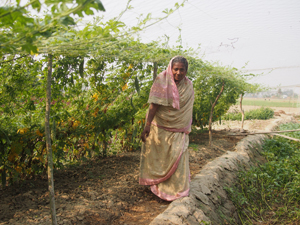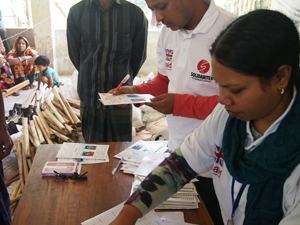In Bangladesh, SOLIDARITÉS INTERNATIONAL has recently completed two complementary programmes in response to Tropical Storm Mahasen, which struck the south of the country in May 2013, causing widespread flooding and extensive damage to agriculture.
 The two programmes had a shared objective: to reduce food insecurity in the areas affected by Tropical Storm Mahasen, and to help restore the livelihoods of vulnerable residents, whose capacity to do so on their own is limited.
The two programmes had a shared objective: to reduce food insecurity in the areas affected by Tropical Storm Mahasen, and to help restore the livelihoods of vulnerable residents, whose capacity to do so on their own is limited.
The two programmes also took a nearly-identical approach. Activities included training in nutrition, breastfeeding, good hygiene practices, Disaster Risk Reduction (DRR), and kitchen gardening. In parallel to these sessions, SOLIDARITÉS INTERNATIONAL ran Cash For Work (CFW) activities, which were combined with Disaster Risk Reduction where possible.
In order to improve the cash delivery process, SOLIDARITÉS INTERNATIONAL implemented a new and innovative technique: mobile money transfer, whereby cash grants, rather than being distributed directly, are stored in an electronic ‘wallet’ which recipients can access via mobile phone.
The use of mobile technology is on the rise in many humanitarian emergencies. In the past few years, mobile money transfer has been successfully used in Kenya and Haiti. “In Bangladesh, mobile financial services have been in place since 2006, but it’s only in the last three years that legislation has been introduced,” explains Anne Johnstone, SOLIDARITÉS INTERNATIONAL’s head of base in Barguna. “Mobile money transfer is therefore a fairly new technique.”
“There are a number of benefits to the system,” says Anne. “Although it’s time-consuming to set up, it’s not complicated to use. A rapidly increasing proportion of the population of Bangladesh own mobile phones, and most of those who don’t can easily borrow one from a relative or friend. This means that mobile money transfer is well-suited to the context.”
 So how does it work? “In collaboration with a mobile network operator, Banglalink, SOLIDARITÉS INTERNATIONAL distributes SIM cards to beneficiary communities. Once the SIM cards are activated, beneficiary accounts are opened with the mobile banking partner, Dutch Bangla Bank Limited (DBBL).
So how does it work? “In collaboration with a mobile network operator, Banglalink, SOLIDARITÉS INTERNATIONAL distributes SIM cards to beneficiary communities. Once the SIM cards are activated, beneficiary accounts are opened with the mobile banking partner, Dutch Bangla Bank Limited (DBBL).
Once SOLIDARITÉS INTERNATIONAL validates a payment, the cash installments are transferred to each ‘client wallet’ by the bank. Recipients are able to withdraw them at any DBBL agent using the code that has been texted to them. This gives them greater flexibility, because they can collect the money when and where it suits them.”
The unconditional cash grants can be used to purchase livestock, seeds, tools and other agricultural inputs. Mobile money transfer: a good example of how SOLIDARITÉS INTERNATIONAL is taking aid further in Bangladesh.
Bangladesh
Context and action- 165.65 million inhabitants
- 129th out of 191 countries on the Human Development Index
- 29.780 people helped

